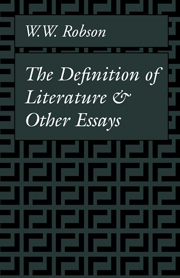Book contents
- Frontmatter
- Contents
- Preface
- Bibliographical note
- 1 The Definition of Literature
- 2 On Liberty of Interpreting
- 3 Evaluative Criticism, and Criticism without Evaluation
- 4 The Novel: a Critical Impasse?
- 5 The Sea Cook: a Study in the Art of Robert Louis Stevenson
- 6 On Kidnapped
- 7 On The Wind in the Willows
- 8 The Present Value of Tennyson
- 9 Robert Frost
- 10 Hopkins and Literary Criticism
- 11 T. S. Eliot: a Poet's Notebook
- 12 I. A. Richards
- 13 Yvor Winters: Counter-romantic
10 - Hopkins and Literary Criticism
Published online by Cambridge University Press: 01 June 2011
- Frontmatter
- Contents
- Preface
- Bibliographical note
- 1 The Definition of Literature
- 2 On Liberty of Interpreting
- 3 Evaluative Criticism, and Criticism without Evaluation
- 4 The Novel: a Critical Impasse?
- 5 The Sea Cook: a Study in the Art of Robert Louis Stevenson
- 6 On Kidnapped
- 7 On The Wind in the Willows
- 8 The Present Value of Tennyson
- 9 Robert Frost
- 10 Hopkins and Literary Criticism
- 11 T. S. Eliot: a Poet's Notebook
- 12 I. A. Richards
- 13 Yvor Winters: Counter-romantic
Summary
There is a view, which goes back at least as far as Seneca, that poets are the best critics of poetry. And at one time T. S. Eliot seems to have held that poets are not only the best, but the only critics of poetry. It will be agreed that poets – creative artists generally – have things of the highest value to say, and things that only poets can say. We need not uncharitably recall the saying of Blake: ‘The poison of the honey-bee / Is the artist's jealousy.’ The insights of innovating poets into what they are trying to do – or not to do – have the highest value. But literature as a whole does not belong to any one writer, or group of writers, any more than to one critic or philosopher, or one school of thought. There is an ancient saying which James Joyce was fond of quoting: securus iudicat orbis terrarum. Literature belongs to all its lovers and appreciators, whoever and wherever they are.
Fortunately creative writers are not always narrow and partial critics of literature. Some of them have been men of great breadth of mind and sensitivity of reaction to the work of others: men like Dryden, Goethe, Baudelaire, Henry James, or Proust. It is into this company that I wish to introduce the name of Hopkins. But in some ways he cuts a strange figure beside them.
- Type
- Chapter
- Information
- The Definition of Literature and Other Essays , pp. 196 - 215Publisher: Cambridge University PressPrint publication year: 1982



